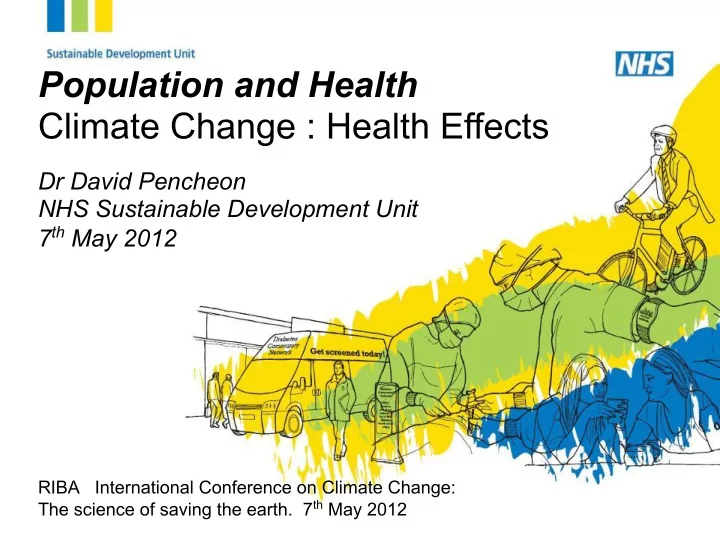

Population and Health Climate Change : Health Effects Dr David Pencheon NHS Sustainable Development Unit 7 th May 2012 RIBA International Conference on Climate Change: The science of saving the earth. 7 th May 2012 www.sdu.nhs.uk
www.sdu.nhs.uk
www.sdu.nhs.uk
The time is now At least 15,000 people died prematurely as a result of Europe’s heat wave in 2003 in France 1 1. Unprecedented heat-related deaths during the 2003 heat wave in Paris: consequences on emergency departments Jean-François Dhainaut, Yann - Erick Claessens, Christine Ginsburg, and Bruno Riou. Crit Care. 2004; 8(1): 1–2. Published online 2003 December 4. doi: 10.1186/cc2404. and Bhattacharya, S. (October 2003), ‘European heat wave caused 35,000 deaths’, The New Scientist. http://www. newscientist.com/article/dn4259 www.sdu.nhs.uk
Although climate change can cause illness and death directly... www.sdu.nhs.uk
…there are even greater health risks through: www.sdu.nhs.uk
The time is now Between 30,000 and 60,000 people died prematurely as a result of Europe’s heat wave in 2003 in France 1 1. Unprecedented heat-related deaths during the 2003 heat wave in Paris: consequences on emergency departments Jean-François Dhainaut, Yann - Erick Claessens, Christine Ginsburg, and Bruno Riou. Crit Care. 2004; 8(1): 1–2. Published online 2003 December 4. doi: 10.1186/cc2404. and Bhattacharya, S. (October 2003), ‘European heat wave caused 35,000 deaths’, The New Scientist. http://www. newscientist.com/article/dn4259 www.sdu.nhs.uk
Population perspective of health and climate change 1. Absolute effect ● Number of people x individual impact 2. Variations in effect globally ● Social justice / ethical www.sdu.nhs.uk
Who produces the greenhouse gases? The world map reflecting production related to climate change. “Climate Change presents the biggest threat to health in the 21 st Century” The Lancet (373;9697 pp 1659-1734, May 16-22 2009). www.sdu.nhs.uk
Who bears the burden? The world map reflecting mortality related to climate change. “Climate Change presents the biggest threat to health in the 21 st Century” The Lancet (373;9697 pp 1659-1734, May 16-22 2009). www.sdu.nhs.uk
Health co-benefits: “What is good for adaptation to, and mitigation of, climate change......is ALSO good for health and healthcare” 1.For the public’s health ● More physical activity, better diet, improved mental health, less road trauma, less air pollution, less obesity/ heart disease/cancer, more social inclusion/cohesion... 2.For the healthcare system ● More prevention, care closer to home, more empowered / self care, better use of drugs, better use of information and IT, fewer unnecessary admissions, better models of care… 3.For global health inequalities / social justice ● Contraction and convergence, technology leapfrogging www.sdu.nhs.uk
www.sdu.nhs.uk
Better healthcare; improved health and social outcomes Traditional health “Health co-benefits” economics of a virtuous cycle Financial Environmental Environmental sustainability sustainability sustainability e.g. Saving money through environmental action www.sdu.nhs.uk
Triple bottom line health care ● Triple bottom line health care ● Economic: best use of financial resources ● More health and social outcomes ● Within environmental limits “the credit crunch is borrowing from the future; the climate crunch is stealing from the future...” www.sdu.nhs.uk
- Barbier, E.,1987. The Concept of Sustainable Economic Development. Environmental Conservation, 14(2):101-110. - Adams, W.M. (2006). "The Future of Sustainability: Re-thinking Environment and Development in the Twenty-first Century."Report of the IUCN Renowned Thinkers Meeting, 29–31 January 2006. www.sdu.nhs.uk
Scott Cato, M. (2009). Green Economics. London: Earthscan, pp. 36– 37. ISBN 9781844075713. www.sdu.nhs.uk
www.sdu.nhs.uk
Why do healthcare organisations take sustainable development and climate change seriously? 1.Save money 2.Comply with regulation 3.Improve resilience 4.Enhance reputation 5.Improve health www.sdu.nhs.uk
What do clinicians / health professionals see as key areas? 1.Helping people eat better and move better 2.Enabling women to have control over their fertility 3.Targeting prescribing on those most likely to benefit 4.Promoting a greater sense of belonging 5.Helping people manage care before / without / after specialist hospital care 6.Helping people manage a better death www.sdu.nhs.uk
See notes of this slides for some of the most important specific actions www.sdu.nhs.uk
www.sdu.nhs.uk
Results of Public Opinion Survey: Source: Ipsos MORI http://www.sdu.nhs.uk/healthcheck2012 http://tiny.cc/w7fg5 www.sdu.nhs.uk
Why doesn’t the health system do more? 1.We are very busy - focussed on the day job 2.We are focussed on reacting to demand, problems and crises, not being proactive to need, planning, policy, preparation or prevention 3.We are doing a lot for health already (“moral offset”) 4.We work in systems that are rewarded for activity, and treatment, not prevention or outcome www.sdu.nhs.uk
www.sdu.nhs.uk
Health professionals taking action? 1. Cholera: 2. 3. Climate 1854 Broad Smoking: change: 2012 Street Pump 1962 Pump www.sdu.nhs.uk
“I’m afraid you have humans” www.sdu.nhs.uk
Recommend
More recommend